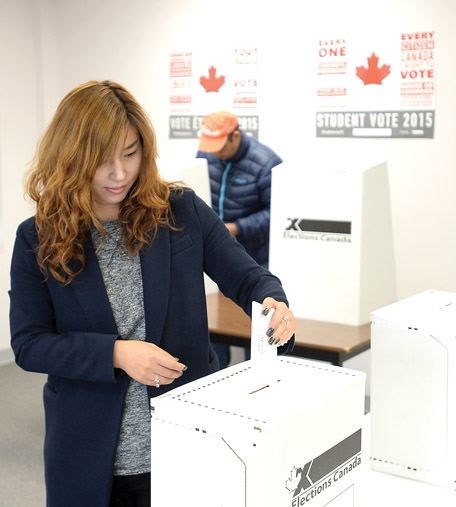Annie Kibonge has never had the chance to vote in a general election.
By the time her home country of Congo had settled into a democratic republic after decades of dictator rule in 2006, Kibonge had already left for South Africa.
She moved to Canada three years ago and has spent the past two years in Prince George where she is now now enrolled in English-language classes with the Immigrant and Multicultural Services Society.
On Oct. 19, Kibonge still won't be able to cast a ballot as she's not yet a Canadian citizen. But on Thursday morning, she and her fellow Language Instruction for Newcomers to Canada (LINC) classmates went through the motions in a Student Vote mock election.
This week, thousands of students across the country are participating in parallel elections, casting authentic ballots for candidates in their ridings after spending weeks learning about the democratic process.
Unlike their elementary and secondary school counterparts, the students at IMSS are old enough to vote, but have to sit this election out due to their citizenship status.
While Kibonge is still awaiting her first chance to vote, others have experiences to which they can compare the Canadian process.
Mandana Akbari marked her mock ballot on her one-year anniversary of arriving in Prince George. The election process is similar to her home country of Iran, Akbari said, though the voting age is lower at 17. In Iran, voters are also not confined to simply selecting a candidate from the riding in which they live.
The process of marking a ballot is far more transparent in Canada than it is in Russia, said Ekaterina Cherednchenko, where voters are secluded in a special room.
In both Russia and Iran, campaigning stops about a week prior to election day, said Cherednchenko and Akbari.
"They give us time to think about everything," Cherednchenko said.
Having the time to learn about the Canadian process and issues is invaluable, said Akbari, despite not being able to participate.
"Voting isn't a joke. It's a very serious process," she said. "If this was the first time I could vote, I don't know about the economy or anything here."
The four years of residence required in Canada before obtaining citizenship gives new Canadians the necessary time to learn how the parliamentary system works and how the platforms of the various political parties fit into everyday life.
"After a language exam and historical exam we will be ready to become a citizen. And I think it's very good," Cherednchenko said. "Our language (skills), our minds will be more ready for information and that information will be better for us because we will understand more than now."
Getting to go through the mock election is a step towards being more comfortable with the process of voting, said Kibonge, who said she is paying close attention to the election on the news.
"It's really, really good to know and to have a voice, to give your choice," she said.
Results from Student Vote elections will be made available early next week.



